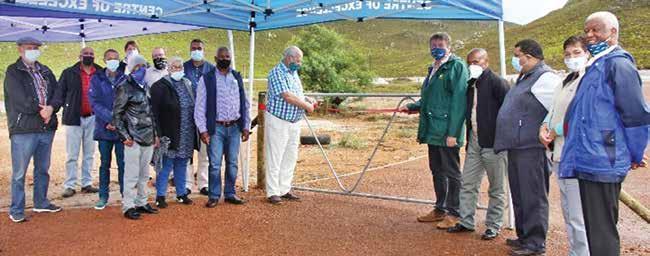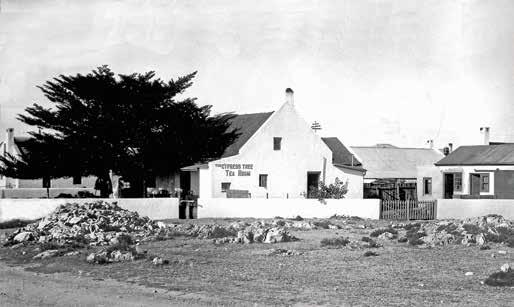24 March 2021
5
www.thevillagenews.co.za
We will fight them on the beaches Writer & Photographer Elaine Davie
T
here are relatively few people around today who remember the war years; others might even ask what war – World War I, World War II… the Boer War? To them, they are all equally distant, devoid of any real relevance. But for those born in the 1930s or the early ’40s, WWII was a lived experience. Dates and names of battles may be significant when plotting the ebb and flow of conflict, but how ordinary people on the ground lived their lives and handled hardship day by day is the stuff of social history. Seldom reflected in academic accounts of the period, it is passed on by word of mouth from generation to generation; a reminder of resilience in a time of fear and confusion. Although South African civilians were fortunate not to have been caught up directly in one of the theatres of war, life for the families of the men who had ‘joined up’ was anything but a bed of roses. On the one hand, they lived in a state of constant anxiety for the safety of their loved ones serving abroad, and on the other, they had to deal with rationing of everything from food to fuel. Many of them were forced to shuttle from pillar to post for somewhere safe and affordable to stay. One such family, consisting of a mother and two small children, found themselves marooned in Hermanus in the early years of the war. That little girl, Elaine Alletson (now Jack) was about six years old when they arrived in the small fishing village to seek refuge with a friend of her parents, Miss Edith Rubery (known as Auntie Betty). Now 84, Elaine has some very clear memories of what their life was like here. “My mother had arrived in Cape Town from RIGHT: Elaine and her little brother with a group of sailors during the war years in Hermanus. BELOW: Elaine Jack with the cartoon drawn for her by ‘Don’ in 1942, after a traumatic episode with an octopus while swimming in a rock pool known by locals as ‘Klaasie’s Pool’.
Rugby, England about eight years earlier, where she had lived a very comfortable, privileged life,” she remembers. “In Cape Town she met and fell in love with my Welsh father, a teacher at Bishop’s School, and they were married. But when war broke out, he ‘joined up’ and was immediately sent ‘up north’ to Egypt, leaving her with me and my younger brother, Simon, to cope on our own. “To be honest, I think my mother was probably totally unsuited to picking up the reins of single motherhood on a very small Air Force salary,” she continues. “The three of us moved from one end of the country to the other, totally rootless, until Auntie Betty, my brother’s godmother, invited us to stay with her in Hermanus.” Auntie Betty owned and ran the Cypress Tree Tea Garden (now Burgundy Restaurant), living in a cottage at the back. “She was a huge part of our lives and although to a small girl she seemed quite formidable, she was kindness itself and I think a great source of support and comfort to my mother. I can remember her decorating an enormous tree in the backyard with Christmas lights. I seem to recall that it was meant to help the Tooth Fairy find her way after one of us children had lost a tooth,” she laughs. Elaine also remembers a Red Cross fête at the Cypress Tree Tea Garden to raise funds for the war effort. Raffle tickets were 1 shilling each and to her mother’s horror, she won a calf. Sadly, the calf was quickly shunted off to the butcher who paid £1 for it. With this huge sum of money clutched in her hand she headed for the toy shop to buy a teddy for 19/6d, together with six, one-penny suckers. After some time with Auntie Betty they were able to find a house of their own to rent ‘in the veld’ on the western perimeter of the village, from which she walked barefoot to school along a gravel
road. Nothing she did at school seemed to leave a lasting impression on her, however, except that she came last in the egg and spoon race and got nits in her hair! Because the house was near to where the New Harbour was being built, more alarmingly, rocks would regularly come hurtling through the air and land in their garden.
of all was my mother’s apparent inability to do blackouts properly. I was absolutely terrified that she might be taken to jail and I would be left with my little brother to manage by ourselves.”
“Of course,” comments Elaine, “in most respects, we led a pretty normal life for children of that era, climbing trees and falling out of them, swimming in a popular rock pool (known by the locals as Klaasie’s pool), where an octopus once grabbed my leg, and collecting wood in the veld for fires in the winter. But what made it different, and often scary, was that the war was never far from our thoughts and our lives.
Royal Navy officers were often around town and after Elaine’s traumatic episode with the octopus, an artist drew a cartoon for her, to diffuse her fears. In it he depicted himself, in uniform, being grabbed by a very congenial octopus, with a cigarette in one tentacle and a bottle of the good stuff in the other, while she, her mother, and little brother watched from a safe distance. The comical picture was signed ‘Don’ 1942, but she has no further clue as to his identity. Perhaps, she thinks, he might have been one of the ubiquitous naval officers.
“There were always tanks and other army vehicles in the town square and at night we would sometimes see the lights of German warships and submarines out at sea, but most frightening
If any reader is able to cast light on this mystery, or would like to share any of their own memories of this period with her, they can contact Elaine at elainefjack@gmail.com.
The Cypress Tree Tea Garden (now Burgundy Restaurant) was owned and run by Miss Edith Rubery (known as Auntie Betty) who invited Elaine’s mother and her two small children to come and stay with her during WWII in her little cottage behind the tea garden.
PHOTO: Old Harbour Museum




















